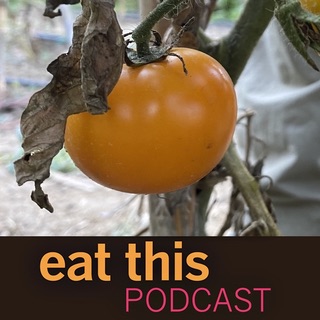
Podcast: Play in new window | Download (Duration: 25:07 — 23.1MB)
Subscribe: Google Podcasts | Spotify | Android | RSS | More
 People, not least parents, have becomes concerned about the increasing proportion of obese and overweight children in wealthier countries. It has even been called an epidemic. Can biology and anthropology deepen our understanding of childhood feeding and suggest possible solutions? Tina Moffat certainly thinks so. She has studied how children are nourished in Japan, Nepal, France and her native Canada. Her book – Small Bites – rounds up the evidence and shares several important observations. Neophobia – trying very small quantities of novel foods until your body is certain they won’t harm you – is a behaviour common to all humans (and other omnivores). Picky eating, which terrifies parents in certain cultures, becomes entrenched by being rewarded. And school lunches demonstrate what society thinks makes a proper meal and the value it places on good childhood nutrition.
People, not least parents, have becomes concerned about the increasing proportion of obese and overweight children in wealthier countries. It has even been called an epidemic. Can biology and anthropology deepen our understanding of childhood feeding and suggest possible solutions? Tina Moffat certainly thinks so. She has studied how children are nourished in Japan, Nepal, France and her native Canada. Her book – Small Bites – rounds up the evidence and shares several important observations. Neophobia – trying very small quantities of novel foods until your body is certain they won’t harm you – is a behaviour common to all humans (and other omnivores). Picky eating, which terrifies parents in certain cultures, becomes entrenched by being rewarded. And school lunches demonstrate what society thinks makes a proper meal and the value it places on good childhood nutrition.
Notes
- Tina Moffat is an Associate professor at McMaster University in Canada. Her book Small Bites: Biocultural Dimension of Children’s Food and Nutrition was published earlier this year by University of British Columbia Press.
- The USDA report I mentioned is Added Sugars in School Meals and Competitive Foods.
- Transcript right here.
- Banner photo assembled from a set created by a catering company around 2015. Other photos from TastEd, a charity that is doing wonderful work to educate children in the UK about food.


 Since the 1960s, European seed law could best be summarised as “everything not forbidden is compulsory”. There is a common catalogue of registered seed varieties, and only varieties on the list are on sale. With a flat fee for registration, only the most lucrative varieties are registered, which suits big seed companies and tomato growers, but meant that lots of varieties with more niche appeal — for home gardeners or small growers — vanished. The law is now being relaxed a little, allowing trade in seeds of “organic heterogeneous material”. Diversity, to you and me.
Since the 1960s, European seed law could best be summarised as “everything not forbidden is compulsory”. There is a common catalogue of registered seed varieties, and only varieties on the list are on sale. With a flat fee for registration, only the most lucrative varieties are registered, which suits big seed companies and tomato growers, but meant that lots of varieties with more niche appeal — for home gardeners or small growers — vanished. The law is now being relaxed a little, allowing trade in seeds of “organic heterogeneous material”. Diversity, to you and me.
 A wet nurse (for that is what Hera was in all tellings of the story) created the Milky Way when her divine milk sprayed across the heavens. Today’s nursing mothers are not so blessed. Although women have a legal right to breastfeed in public across the United States and the UK (and many other countries), there are plenty of individuals who seem to think that they have the right to tell them to stop, and plenty of new mothers who are intimidated enough not to try. Why? How can this most essential of food chains possibly be considered shameful? And then there are the women who would dearly love to breastfeed their infants, but cannot. In this episode, experts on infant feeding discuss the history and current status of mothers’ milk and its various substitutes.
A wet nurse (for that is what Hera was in all tellings of the story) created the Milky Way when her divine milk sprayed across the heavens. Today’s nursing mothers are not so blessed. Although women have a legal right to breastfeed in public across the United States and the UK (and many other countries), there are plenty of individuals who seem to think that they have the right to tell them to stop, and plenty of new mothers who are intimidated enough not to try. Why? How can this most essential of food chains possibly be considered shameful? And then there are the women who would dearly love to breastfeed their infants, but cannot. In this episode, experts on infant feeding discuss the history and current status of mothers’ milk and its various substitutes.
 Atkins. South Beach. Whole30. Zone. Keto. Banting? Yes, Banting. Not the Frederick Banting of Banting & Best, discoverers of insulin, but his distant relative William Banting, author, in 1863, of the self-published Letter on Corpulence, Addressed to the Public. Not the first fad diet by any means — Banting, a prominent London undertaker, had tried a bunch — it is the model, acknowledged and otherwise, for all the high-fat, low carbohydrate diets now so familiar and one of the first to seize the public imagination.
Atkins. South Beach. Whole30. Zone. Keto. Banting? Yes, Banting. Not the Frederick Banting of Banting & Best, discoverers of insulin, but his distant relative William Banting, author, in 1863, of the self-published Letter on Corpulence, Addressed to the Public. Not the first fad diet by any means — Banting, a prominent London undertaker, had tried a bunch — it is the model, acknowledged and otherwise, for all the high-fat, low carbohydrate diets now so familiar and one of the first to seize the public imagination.